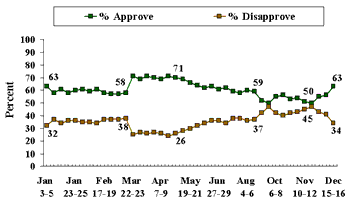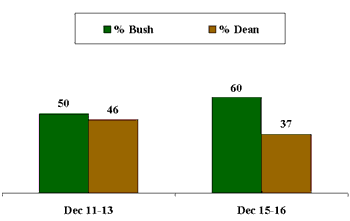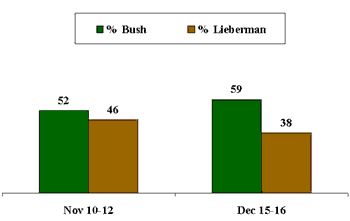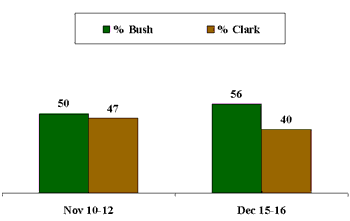PRINCETON, NJ -- In the wake of the capture of Saddam Hussein, President George W. Bush's job approval rating has increased significantly, as has his electoral strength against Democratic candidates for the 2004 election. Vermont Gov. Howard Dean remains the clear front-runner for his party's nomination, but his level of support is down slightly from when it was measured just prior to Hussein's capture.
The latest CNN/USA Today/║┌┴¤═° survey was conducted Dec. 15-16, two days after the stunning announcement on Sunday that Hussein had finally been captured by U.S. troops. Bush's approval is now at 63%, the highest since last June, and seven percentage points higher than what ║┌┴¤═° obtained in a Dec. 11-14 poll. Bush's job approval rating started to gain on Sunday, Dec. 14, the day of the announcement. If interviews for that day are excluded, Bush's pre-Hussein capture approval rating, obtained on Thursday, Friday, and Saturday was actually 54%, suggesting his approval rallied by nine points.
| George W. Bush’s Job Approval Rating — 2003 |
 |
An incumbent president's job approval rating is usually a good indicator of his electoral strength, so it's not surprising that Bush now fares better against Democratic front-runner Howard Dean than he did before the capture. In the three days of polling from Dec. 11-13 ║┌┴¤═° found Bush barely beating Dean, by 50% to 46% among registered voters. That four-point lead mushroomed to 23 points, as Bush now leads Dean among registered voters by 60% to 37%.
| Hypothetical Race: George W. Bush and Howard Dean Measured Before and After Capture of Saddam Hussein (Among Registered Voters) |
 |
Bush's current lead among two other Democratic candidates is also substantial. Among registered voters, the president enjoys a 59% to 38% lead over Connecticut Sen. Joe Lieberman, and a 56% to 40% lead over retired Gen. Wesley Clark. Neither Lieberman nor Clark were included in the Dec. 11-14 poll, but they were pitted against Bush in a Nov. 10-12 poll. At that time among registered voters, Bush led Clark by three points (50% to 47%), and Lieberman by six points (52% to 46%).
| Hypothetical Race: George W. Bush and Joe Lieberman (Among Registered Voters) |
 |
| Hypothetical Race: George W. Bush and Wesley Clark (Among Registered Voters) |
 |
For Clark, the new figures represent a 13-point swing in support toward Bush, and for Lieberman a 15-point swing, suggesting the surge is more for Bush than against any specific Democrat. Lieberman has expressed the most support among Democratic candidates for the war in Iraq, and after Hussein's capture, he was especially prominent in the news criticizing Dean's anti-war stance. Clark has also been a strong opponent of the war, but his loss of support is about the same as Lieberman's.
In fact, Dean's loss of support from the Nov. 10-12 poll is also about the same as that experienced by Lieberman. In that poll, Dean trailed Bush among registered voters by nine points, 53% to 44%, while he now trails by 23 points -- a 14-point swing in support for Bush.
Modest Decline in Dean's Support Among Democrats
Dean emerged this month as the clear front-runner among Democrats across the country when they are asked whom they support for their party's nomination. He has more than double the support of any another Democrat in each of three polls conducted this month -- Dec. 5-7, Dec. 11-14, and Dec. 15-16. It is too early to determine if Dean's front-runner status has been significantly hurt by his aggressive anti-war stance in the wake of the capture of Hussein, but the polling trends indicate that he is doing slightly less well now than he did immediately before the capture became front-page news.
In the three days leading to Hussein's capture, Dean led all Democratic candidates, with 33% support among Democrats and Democratic leaners who were registered to vote. That figure dropped to 27% in the latest poll, about the same as it was earlier in the month (25%), in the Dec. 5-7 poll. After former Vice President Al Gore endorsed Dean, the candidate's support rose by several percentage points.
Although Lieberman has been the most pro-war of the Democratic candidates and the most vocal in his criticisms of Dean's positions after the weekend capture of Hussein, ║┌┴¤═° found no increase in Democratic support for Lieberman. Support for all the other candidates is also about the same now as it was before Hussein's capture. Lieberman and Clark each receive 12% support, followed by Missouri Rep. Richard Gephardt and Massachusetts Sen. John Kerry with 7% each.
Next, I'm going to read a list of people who may be running in the Democratic primary for president in the next election. After I read all the names, please tell me which of those candidates you would be most likely to support for the Democratic nomination for President in the year 2004.
BASED ON 356 DEMOCRATS OR DEMOCRATIC LEANERS WHO ARE REGISTERED TO VOTE
|
|
Lieberman |
|
Gep-hardt |
|
Ed-wards |
Sharp-ton |
|
Kuc-inich |
Gra-ham |
None/ other/ no opin. |
|
|
% |
% |
% |
% |
% |
% |
% |
% |
% |
% |
% |
|
|
2003 Dec 15-16 |
27 |
12 |
12 |
7 |
7 |
6 |
6 |
3 |
2 |
-- |
18 |
|
2003 Dec 11-13* |
33 |
12 |
11 |
9 |
10 |
4 |
5 |
2 |
1 |
-- |
13 |
|
2003 Dec 5-7 |
25 |
10 |
17 |
14 |
7 |
7 |
3 |
5 |
2 |
-- |
10 |
|
2003 Nov 14-16 |
17 |
13 |
17 |
13 |
9 |
6 |
5 |
4 |
3 |
-- |
13 |
|
2003 Nov 10-12 |
17 |
15 |
14 |
12 |
10 |
7 |
3 |
4 |
3 |
-- |
15 |
|
* Based on three of the four days of the Dec. 11-14 poll. For full results of this poll, see below. |
|||||||||||
Survey Methods
These results are based on telephone interviews with a randomly selected national sample of 1,000 adults, aged 18 and older, conducted Dec. 15-16, 2003. For results based on this sample, one can say with 95% confidence that the maximum error attributable to sampling and other random effects is ±3 percentage points. In addition to sampling error, question wording and practical difficulties in conducting surveys can introduce error or bias into the findings of public opinion polls.
2. Next, I'm going to read a list of people who may be running in the Democratic primary for president in the next election. After I read all the names, please tell me which of those candidates you would be most likely to support for the Democratic nomination for President in the year 2004. [ROTATED:Massachusetts Senator, John Kerry, Connecticut Senator, Joe Lieberman, North Carolina Senator, John Edwards, Missouri Congressman, Dick Gephardt, Former Vermont Governor, Howard Dean, the Reverend Al Sharpton, Ohio Congressman, Dennis Kucinich, Former Illinois Senator, Carol Moseley Braun, Retired General, Wesley Clark]
BASED ON 415 DEMOCRATS OR DEMOCRATIC LEANERS
BASED ON 356 DEMOCRATS OR DEMOCRATIC LEANERS WHO ARE REGISTERED TO VOTE
|
|
Lieb-erman |
|
Gep-hardt |
|
Ed-wards |
Sharp-ton |
|
Kuc-inich |
Gra-ham |
None/ other/ no opin. |
||
|
% |
% |
% |
% |
% |
% |
% |
% |
% |
% |
% |
||
|
Democrats/Democratic Leaners |
||||||||||||
|
2003 Dec 15-16 |
25 |
14 |
11 |
8 |
7 |
7 |
6 |
3 |
2 |
-- |
17 |
|
|
2003 Dec 11-14 |
28 |
12 |
12 |
7 |
9 |
6 |
5 |
3 |
1 |
-- |
17 |
|
|
2003 Dec 5-7 |
22 |
10 |
17 |
13 |
7 |
7 |
4 |
5 |
2 |
-- |
13 |
|
|
2003 Nov 14-16 |
16 |
14 |
16 |
12 |
10 |
5 |
4 |
5 |
3 |
-- |
15 |
|
|
2003 Nov 10-12 |
16 |
15 |
13 |
11 |
9 |
9 |
3 |
4 |
3 |
-- |
17 |
|
|
2003 Oct 24-26 |
15 |
11 |
15 |
12 |
9 |
6 |
6 |
4 |
2 |
-- |
20 |
|
|
2003 Oct 10-12 |
13 |
12 |
19 |
9 |
10 |
5 |
7 |
5 |
3 |
-- |
17 |
|
|
2003 Oct 6-8 ^ |
15 |
13 |
20 |
8 |
12 |
3 |
5 |
4 |
2 |
-- |
18 |
|
|
2003 Sep 19-21 |
12 |
11 |
21 |
9 |
12 |
4 |
5 |
3 |
2 |
4 |
17 |
|
|
2003 Sep 8-10 |
13 |
12 |
9 |
15 |
11 |
5 |
3 |
5 |
2 |
5 |
20 |
|
|
2003 Aug 25-26 |
11 |
23 |
2 |
13 |
9 |
5 |
4 |
4 |
1 |
6 |
22 |
|
|
2003 Aug 4-6 |
14 |
17 |
-- |
14 |
12 |
6 |
4 |
5 |
2 |
5 |
21 |
|
|
2003 Jul 25-27 |
10 |
20 |
-- |
14 |
16 |
6 |
5 |
6 |
2 |
5 |
16 |
|
|
2003 Jun 12-18 |
6 |
20 |
-- |
15 |
13 |
7 |
7 |
6 |
1 |
6 |
19 |
|
|
2003 May 31-Jun 1 |
5 |
21 |
-- |
14 |
16 |
7 |
7 |
3 |
3 |
4 |
20 |
|
|
2003 Apr 22-23 |
6 |
23 |
-- |
15 |
17 |
9 |
3 |
4 |
3 |
5 |
15 |
|
|
Democrats/Democratic Leaners Who Are Registered to Vote |
||||||||||||
|
2003 Dec 15-16 |
27 |
12 |
12 |
7 |
7 |
6 |
6 |
3 |
2 |
-- |
18 |
|
|
2003 Dec 11-14 |
31 |
13 |
10 |
8 |
10 |
4 |
5 |
3 |
1 |
-- |
15 |
|
|
2003 Dec 5-7 |
25 |
10 |
17 |
14 |
7 |
7 |
3 |
5 |
2 |
-- |
10 |
|
|
2003 Nov 14-16 |
17 |
13 |
17 |
13 |
9 |
6 |
5 |
4 |
3 |
-- |
13 |
|
|
2003 Nov 10-12 |
17 |
15 |
14 |
12 |
10 |
7 |
3 |
4 |
3 |
-- |
15 |
|
|
2003 Oct 24-26 |
16 |
12 |
15 |
12 |
10 |
6 |
6 |
4 |
1 |
-- |
18 |
|
|
2003 Oct 10-12 |
13 |
13 |
18 |
10 |
11 |
6 |
6 |
5 |
3 |
-- |
15 |
|
|
2003 Oct 6-8 ^ |
16 |
13 |
21 |
8 |
13 |
2 |
6 |
4 |
2 |
-- |
15 |
|
|
2003 Sep 19-21 |
13 |
10 |
22 |
11 |
11 |
4 |
4 |
3 |
2 |
4 |
16 |
|
|
2003 Sep 8-10 |
14 |
13 |
10 |
16 |
12 |
5 |
2 |
4 |
2 |
5 |
17 |
|
|
2003 Aug 25-26 |
12 |
23 |
2 |
13 |
10 |
5 |
4 |
5 |
1 |
4 |
21 |
|
|
2003 Aug 4-6 |
15 |
18 |
-- |
15 |
12 |
5 |
4 |
5 |
2 |
5 |
19 |
|
|
2003 Jul 25-27 |
11 |
21 |
-- |
16 |
15 |
6 |
5 |
6 |
2 |
4 |
14 |
|
|
2003 Jun 12-18 |
7 |
21 |
-- |
17 |
13 |
6 |
6 |
5 |
1 |
7 |
17 |
|
|
2003 May 31-Jun 1 |
5 |
20 |
-- |
14 |
17 |
6 |
7 |
4 |
2 |
4 |
21 |
|
|
2003 Apr 22-23 |
6 |
22 |
-- |
16 |
18 |
8 |
3 |
4 |
3 |
5 |
15 |
|
|
^ |
NOTE: Bob Graham dropped out of race on Oct. 6, his name was removed from question for Oct. 7-8 interviewing and in subsequent polls; "Graham" responses from Oct. 6 included in "other" category. |
|||||||||||
Next, we'd like you to think about the general election for President to be held next year, that is in November 2004.
Q.3/3A-5/5A ROTATED
3. If retired General Wesley Clark were the Democratic Party's candidate and George W. Bush were the Republican Party's candidate, who would you be more likely to vote for – [ROTATED: Wesley Clark, the Democrat (or) George W. Bush, the Republican]?
3A. As of today, do you lean more toward -- [ROTATED: Clark, the Democrat (or) Bush, the Republican]?
|
|
|
NEITHER |
OTHER |
No |
|
|
% |
% |
% |
% |
% |
|
|
National Adults |
|||||
|
2003 Dec 15-16 |
40 |
55 |
3 |
* |
2 |
|
2003 Nov 10-12 |
45 |
52 |
1 |
-- |
2 |
|
2003 Sep 19-21 |
48 |
46 |
3 |
* |
3 |
|
Registered Voters |
|||||
|
2003 Dec 15-16 |
40 |
56 |
2 |
* |
2 |
|
2003 Nov 10-12 |
47 |
50 |
1 |
-- |
2 |
|
2003 Sep 19-21 |
49 |
46 |
2 |
* |
3 |
|
(vol.) Volunteered response |
|||||
|
* Less than 0.5% |
|||||
4. If former Vermont Governor Howard Dean were the Democratic Party's candidate and George W. Bush were the Republican Party's candidate, who would you be more likely to vote for -- [ROTATED: Howard Dean, the Democrat (or) George W. Bush, the Republican]?
4A. As of today, do you lean more toward -- [ROTATED: Dean, the Democrat (or) Bush, the Republican]?
|
|
|
NEITHER |
OTHER |
No |
|
|
% |
% |
% |
% |
% |
|
|
National Adults |
|||||
|
2003 Dec 15-16 |
37 |
59 |
2 |
* |
2 |
|
2003 Dec 11-14 |
44 |
52 |
2 |
-- |
2 |
|
2003 Nov 10-12 |
43 |
53 |
1 |
-- |
3 |
|
2003 Sep 19-21 |
45 |
49 |
3 |
1 |
2 |
|
Registered Voters |
|||||
|
2003 Dec 15-16 |
37 |
60 |
1 |
* |
2 |
|
2003 Dec 11-14 |
44 |
52 |
2 |
-- |
2 |
|
2003 Nov 10-12 |
44 |
53 |
1 |
-- |
2 |
|
2003 Sep 19-21 |
46 |
49 |
2 |
1 |
2 |
|
(vol.) Volunteered response |
|||||
|
* Less than 0.5% |
|||||
5. If Connecticut Senator Joe Lieberman were the Democratic Party's candidate and George W. Bush were the Republican Party's candidate, who would you be more likely to vote for – [ROTATED: Joe Lieberman, the Democrat (or) George W. Bush, the Republican]?
5A. As of today, do you lean more toward -- [ROTATED: Lieberman, the Democrat (or) Bush, the Republican]?
|
|
|
NEITHER |
OTHER |
No |
|
|
% |
% |
% |
% |
% |
|
|
National Adults |
|||||
|
2003 Dec 15-16 |
38 |
58 |
3 |
* |
1 |
|
2003 Nov 10-12 |
45 |
52 |
2 |
* |
1 |
|
2003 Sep 19-21 |
46 |
49 |
3 |
* |
2 |
|
Registered Voters |
|||||
|
2003 Dec 15-16 |
38 |
59 |
2 |
* |
1 |
|
2003 Nov 10-12 |
46 |
52 |
1 |
* |
1 |
|
2003 Sep 19-21 |
47 |
48 |
3 |
* |
2 |
|
* Less than 0.5% |
|||||
|
(vol.) Volunteered response |
|||||
